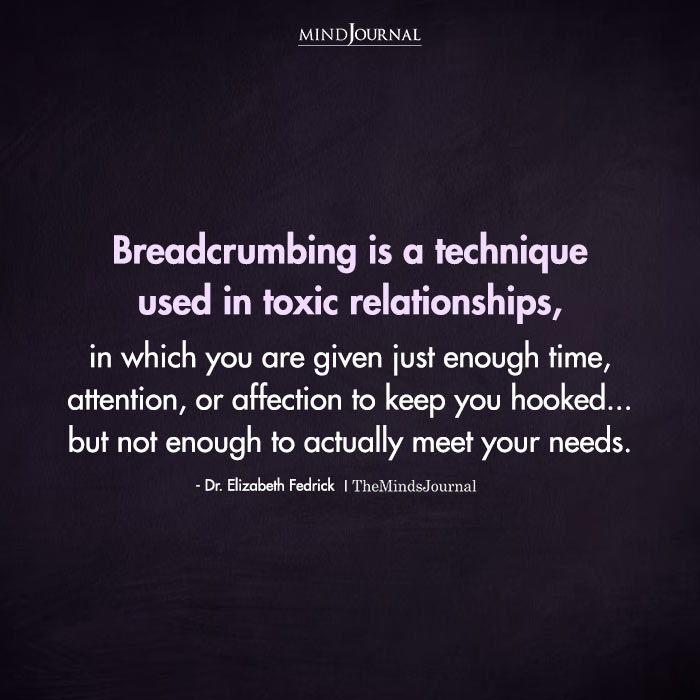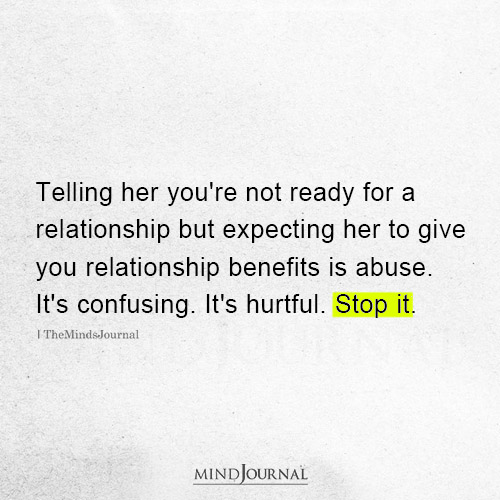Have you ever been on the other side of breadcrumbing? If you have, you know how horrible it feels. So, what is the best way to deal with this? Let’s find out, shall we?
KEY POINTS
- Breadcrumbing is characterised by avoidance of intimacy and commitment uncertainty.
- Breadcrumbers often want to seek attention from their partners and appear cool to their friends.
- Dealing with breadcrumbing sometimes involves breadcrumbing others.
Breadcrumbing takes its name from the Grimm Brothers story of Hansel and Gretel — two children who in escaping from their wicked stepmother, dropped breadcrumbs on the floor in the hope that they could follow them home at a later time. Yet when they looked for the breadcrumbs to guide them home, they had vanished.
Analogous to this, in a dating context breadcrumbing means throwing crumbs of hope to an admirer, despite having no romantic interest in them. In such a situation, the breadcrumbs of romantic hope disappear.
Typically, breadcrumbers send mixed signals to potential admirers, varying between overwhelming passion followed suddenly by remoteness.
In a recent study, Vivek Khattar, Shreya Upadhyay and Raúl Navarro set out to investigate breadcrumbing behaviour. They carried out focus group discussions with nine participants aged between 18 and 35.
Participants were included only if they had experienced breadcrumbing in dating or in a relationship during the last year (Khattar V., Upadhyay S, & Navarro, R., 2023). The group discussions revolved around several areas outlined below.
Related: Are You Being Breadcrumbed? 6 Alarming Signs And How To Manage It
What is breadcrumbing?
In terms of defining breadcrumbing, the key themes identified were flirtatious behaviour comprising of luring someone, flirting, giving compliments and showing romantic interest.
Pretentiousness, which involved giving false hope about the future, or maybe expressing love too early. Incongruence, where the person breadcrumbed senses that something is wrong, because a breadcrumber’s actions were not consistent with what was being said.
Avoidance of intimacy, where the breadcrumber spends less time with the person breadcrumbed and commitment uncertainty, which means that the breadcrumber attempts to avoid commitment and responsibility.
In addition, breadcrumbers may make excuses or delay commitment, and avoid conversations regarding the status of the relationship.

Breadcrumbing behaviour
Indicators of breadcrumbing were identified as changes in behaviour towards a partner, in terms of avoidance of commitment, confrontation and making excuses.
Some participants reported that they noticed that their partner’s behaviour and communication style had changed and maybe there was an ‘imbalance’ in the relationship characterised by distancing behaviour or a partner making little effort in the relationship.
The impact of breadcrumbing
The most notable impact of breadcrumbing on the person being breadcrumbed which was reported by all participants was that they felt less likely to trust other romantic partners in the future.
Many reported feelings of insecurity or anxiety or not feeling emotionally safe in a relationship. Furthermore, they reported having issues in accepting commitment and not being able to express themselves emotionally.
Emotional disturbance was also mentioned, which was associated with the breadcrumbed person’s fear of going through a similar cycle in future.
Some of the participants reported internalised anger, and overthinking, and feelings of jealousy and frustration.
Related: Spotting the Warning Signs: How to Recognize If You Are Being Breadcrumbed in Your Relationship
Reasons for breadcrumbing
In terms of the reasons given for why they thought that people engage in breadcrumbing, just over half of the participants in this study suggested that the breadcrumber acted as such to seek attention from their partners and to appear cool to their friends.
Roughly one-third said that breadcrumbers may have had a fear of being alone. Others said that breadcrumbers possibly had low self-esteem or may need emotional support, affection or may have a need to have power over their partner.
Reasons for complying with breadcrumbing
It may seem surprising that people actually complied and accepted breadcrumbing, but nearly half of participants reported that they were hopeful of the future of their relationship, whereas just two out of nine said they eventually expected a reciprocation of feelings from their partner, despite the fact that this never happened.
Similarly, another two said that they did not want to feel guilty for not taking a chance or that they wished to treat someone in the correct way.
Participants also mentioned an inability to establish boundaries themselves, which meant the breadcrumber was able to mislead them.

Effective ways of dealing with breadcrumbing
Given that breadcrumbing is not an acceptable way to lead a relationship, then ways of dealing with this need to be considered. To this end, the researchers asked participants to outline from their experiences how they would deal with breadcrumbing.
Effective methods included seeking social support from family, friends, or even social media platforms, which was reported by over half of participants.
Self-work involved investing time in oneself and doing things that brought participants pleasure, finding something meaningful to do and concentrating on other relationships such as those with family. This was reported by all participants as a coping strategy.
A further method was distraction which included concentrating on other parts of life not associated with romantic relationships, such as career or study goals. Other participants mentioned travel plans or health, in order to occupy their minds and stop them thinking of relationships.
A further effective way to deal with the breadcrumber was to move on from the relationship. This could mean cutting ties in order to regain some strength. Two out of nine participants reported confronting their partners to get closure and start afresh.
Finally, pragmatic techniques included getting into another relationship, or even breadcrumbing others. Three out of nine participants reported confronting their partners face-to-face to describe their experience in the hope that they would not breadcrumb other people.
This study provides useful initial information in understanding breadcrumbing, However, one limitation is possibly its lack of generalisability to a wider population as the results were gathered from small focus groups.
Related: What Is Breadcrumbing? 3 Reasons Why It Is Worse Than Ghosting
Furthermore, the data were obtained just from the point of view of victims of breadcrumbing and maybe a clearer, more balanced perspective would be gained from interviewing breadcrumbers also.
Nevertheless, the study is useful in providing some insight into the types of behaviour it is possible to experience as a result of using online platforms, where the ease and temptation to engage in breadcrumbing may be more prevalent.
References:
Khattar V., Upadhyay S, & Navarro, R. (2023). Young Adults’ Perception of Breadcrumbing Victimization in Dating Relationships. Societies, 13, 41.
Written By Martin Graff
Originally Appeared On Psychology Today









Leave a Reply
You must be logged in to post a comment.